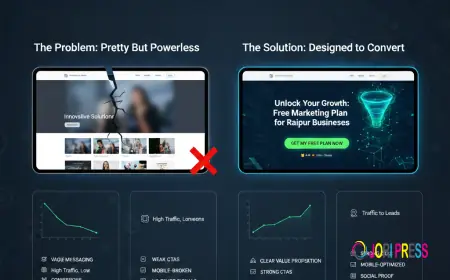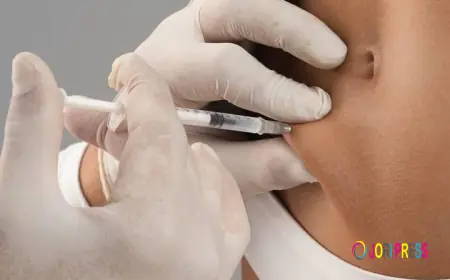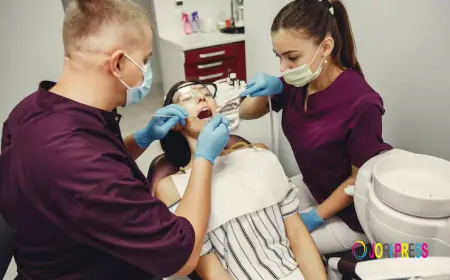The Importance of Preventive Health in Complete Care for Kids
Discover expert tips on complete care for kids, from nutrition and wellness to emotional growth, ensuring every child thrives at each stage of life.
Raising healthy children goes beyond treating illnesses when they appear—it’s about preventing them in the first place. Preventive healthcare is the foundation of complete care for kids, ensuring children grow strong, resilient, and ready to face each stage of development. By focusing on regular checkups, vaccinations, healthy habits, and early detection of potential issues, parents can provide their children with the tools for a lifetime of wellness.
In this blog, we’ll explore why preventive health is essential, the key components of a preventive care plan, and how parents can create a supportive environment that nurtures their child’s overall well-being.
Why Preventive Health Matters in Complete Care for Kids
Preventive health focuses on anticipating and reducing health risks before they become major problems. When applied to children, it ensures that growth milestones are met, diseases are avoided, and long-term health outcomes improve. Here are some reasons preventive care is vital in complete care for kids:
-
Early detection of issues: Routine checkups help identify developmental, behavioral, or physical problems at an early stage, making treatment more effective.
-
Stronger immunity: Vaccinations protect children from serious illnesses and help reduce the spread of infections in the community.
-
Healthy habits: Preventive care teaches children the importance of exercise, nutrition, and hygiene early in life.
-
Reduced healthcare costs: Addressing small problems early prevents larger, more expensive health issues later.
Preventive health not only helps children avoid sickness but also empowers families to take an active role in their child’s overall wellness.
Key Components of Preventive Health in Complete Care for Kids
To provide complete care for kids, preventive health must cover multiple aspects of physical, mental, and social well-being. Here are the essential elements every parent should include in their child’s care plan.
1. Routine Checkups
Well-child visits are critical to preventive care. These appointments monitor a child’s growth, development, vision, hearing, and overall health. Pediatricians also track milestones to ensure children are progressing physically and cognitively.
2. Immunizations
Vaccinations are among the most effective preventive measures. They protect against diseases like measles, polio, influenza, and whooping cough. Following a recommended vaccination schedule is vital in ensuring complete care for kids.
3. Nutrition and Healthy Eating
Diet plays a major role in preventing childhood obesity, diabetes, and nutrient deficiencies. Parents should encourage a balanced diet rich in fruits, vegetables, whole grains, and lean proteins while limiting processed foods and sugary snacks.
4. Physical Activity
Regular exercise improves cardiovascular health, strengthens bones and muscles, and boosts mood. Encouraging outdoor play, sports, or family walks supports children’s physical and mental health.
5. Oral Health
Dental checkups are a vital but often overlooked part of preventive health. Cavities and gum disease can affect speech, nutrition, and overall health. Teaching children proper brushing and flossing habits ensures long-term dental well-being.
6. Mental and Emotional Health
Complete care includes monitoring a child’s emotional well-being. Encouraging open communication, teaching stress management, and being aware of anxiety or behavioral changes help children thrive emotionally.
7. Safety and Injury Prevention
From childproofing the home to teaching safe road-crossing habits, injury prevention is a major part of preventive care. Providing a safe environment ensures children avoid unnecessary accidents.
The Role of Parents in Preventive Health
Parents are the most important advocates for their child’s health. By actively participating in complete care for kids, they help establish long-term patterns of wellness. Here’s how parents can support preventive health:
-
Keep up with checkups: Schedule regular doctor and dental visits.
-
Encourage healthy habits: Lead by example with good nutrition and exercise.
-
Maintain vaccination schedules: Ensure children are up to date with immunizations.
-
Foster emotional support: Provide a safe space for children to express their feelings.
-
Create routines: Consistent sleep, meal, and activity schedules promote stability.
Long-Term Benefits of Preventive Care in Children
Investing in preventive health doesn’t just benefit children today—it shapes their future. Some long-term benefits include:
-
Reduced risk of chronic conditions such as obesity, diabetes, and heart disease.
-
Stronger mental health and emotional resilience.
-
Better academic performance due to fewer sick days and improved focus.
-
Increased life expectancy and quality of life.
Preventive health gives children a strong foundation for adulthood, ensuring they grow into healthy, capable individuals.
FAQs About Complete Care for Kids and Preventive Health
Q1: How often should children have preventive checkups?
Most children should have well-child visits annually, though infants may require more frequent visits in their first year.
Q2: Why are vaccinations important in complete care for kids?
Vaccinations protect children from life-threatening diseases and help maintain community immunity, keeping everyone safer.
Q3: What role does nutrition play in preventive health?
Good nutrition supports growth, strengthens immunity, and prevents obesity and other health conditions. Balanced diets are essential to complete care for kids.
Q4: How can parents encourage physical activity in children?
Parents can make physical activity fun by involving children in sports, dance, outdoor play, or family activities like biking and hiking.
Q5: When should parents start focusing on preventive health?
Preventive health begins at birth. From immunizations to nutrition and emotional support, starting early ensures a strong foundation for lifelong well-being.
Final Thoughts
Preventive healthcare is not just about avoiding illness—it’s about setting children up for a healthy, happy life. By focusing on routine checkups, vaccinations, nutrition, mental well-being, and safety, parents can provide complete care for kids that ensures long-term wellness. Preventive health empowers children to thrive at every stage of life, giving families peace of mind and a future filled with opportunities.
What's Your Reaction?
 Like
0
Like
0
 Dislike
0
Dislike
0
 Love
0
Love
0
 Funny
0
Funny
0
 Angry
0
Angry
0
 Sad
0
Sad
0
 Wow
0
Wow
0
















































